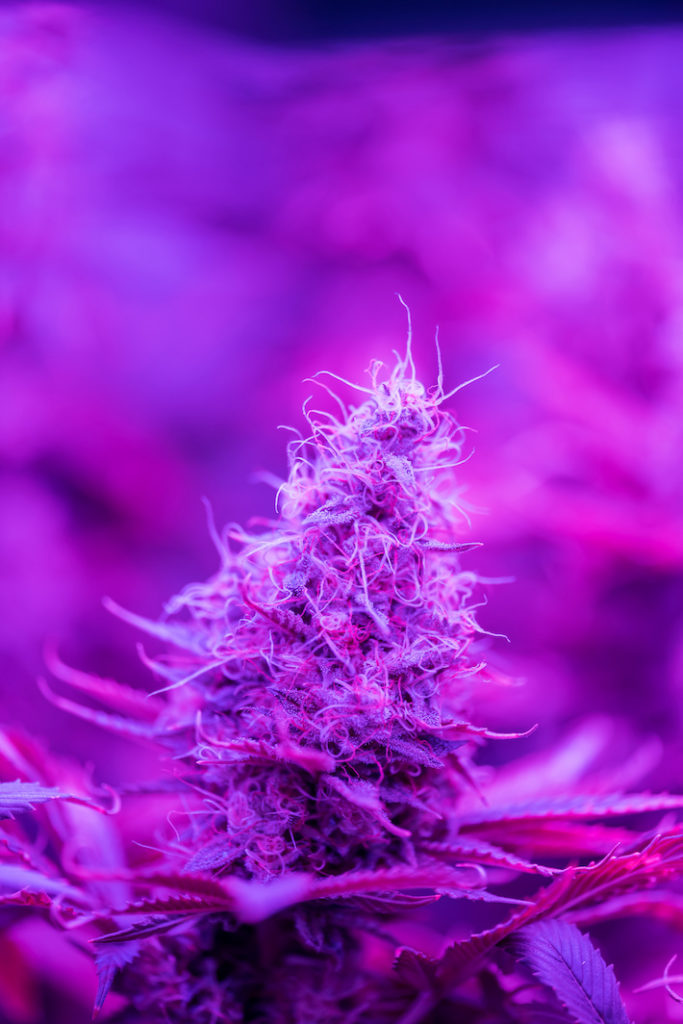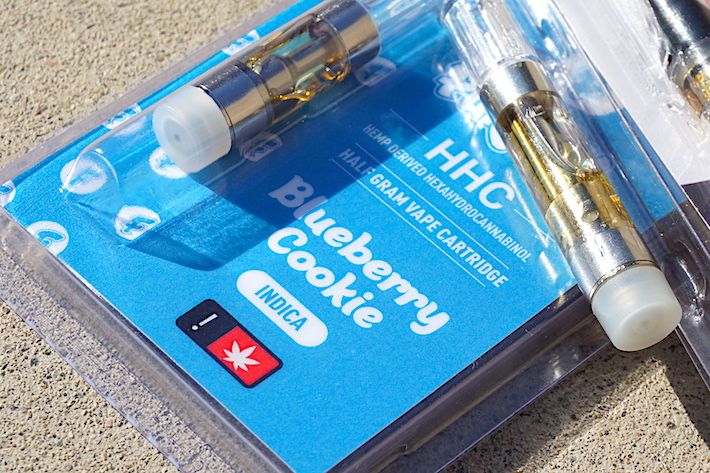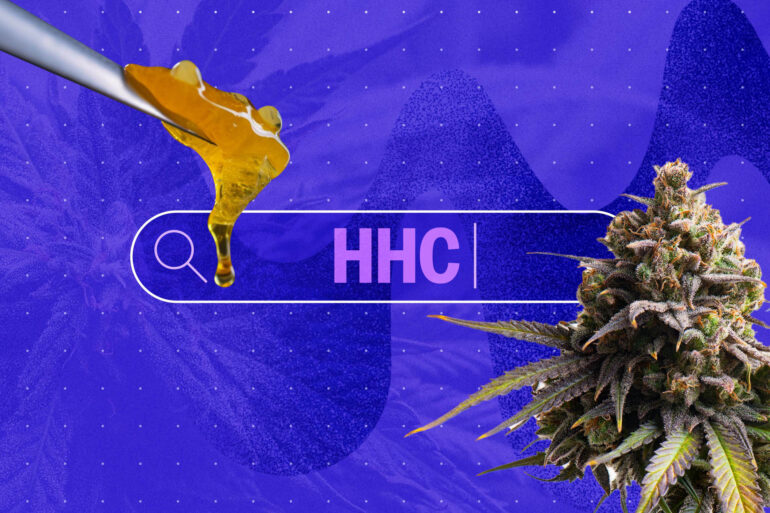Key Takeaways
- HHC is a cannabinoid similar to THC but less potent, offering a milder experience.
- It provides potential benefits like relaxation and euphoria without the intense effects of THC.
- HHC is emerging as a new option for those seeking a balanced cannabinoid experience.
Short for hexahydrocannabinol, HHC is another new cannabinoid that’s been making its rounds across the cannabis industry.
Since its arrival, people have been interested in learning more about HHC’s effects, efficacy, potency, and whether or not it’s something worth trying out.
Here, our team is taking a deep dive into the world of HHC. From effects to chemical composition and everything in between, we’re covering it all.
HHC: Introducing Hydrogenation to the World of Weed
If you haven’t heard of the cannabinoid HHC yet, that’s because it was only recently introduced to the mainstream cannabis market — despite actually being discovered back in the 1940s.
Famous cannabis chemist Roger Adams first curated this unique cannabinoid by taking the THC molecule and combining it with hydrogen atoms.
This process came to be known as hydrogenation and while it became popular in chemistry for other resources, such as making margarine from vegetable oil, it didn’t stick as a way to craft cannabinoids until many decades later.
The chemical structure of HHC is unique. HHC has a chemical formula of C21H32O2, compared to THC’s C21H30O2 — similar, but still different.
Interestingly enough, HHC doesn’t have a double-bond structure within the cyclohexyl ring the way that delta-8 and delta-9 THC do. Instead, this double bond is broken which allows two more hydrogens to bond to the ring, going up from four hydrogens to six on the ring.
Hence, tetrahydrocannabinol (“tetra” and “hydro”, meaning 4 hydrogens) becomes hexahydrocannabinol (“hexahydro”, meaning six hydrogens).
This also means that the cannabinoid’s affinity to the CB1 receptor is going to be much weaker than delta-9’s.
Still, the cannabinoid has a psychoactive profile that produces supportive effects throughout the body, and it appears that HHC has the potential for various medicinal applications.
However, people are concerned about the process it takes to actually create the cannabinoid, as well as what kind of implications this has on the industry as a whole.
But Wait, Does HHC Get You High?
HHC may not bind with the CB1 receptors as well as delta-9 THC, but the cannabinoid can still get you high.
Hexahydrocannabinol is a psychoactive cannabinoid; thus, it can produce feelings of intoxication and bliss. It’s important to remember that HHC and THC do have similar chemical structures, so they also produce similar effects: HHC is just not going to be as powerful.
RELATED: HHC vs THC: Is HHC Stronger Than THC?
This means that HHC may be helpful for dealing with chronic pains and discomfort, nausea, stress, and sleep.
But, as a cannabinoid that the industry has only recently been able to look into, we still don’t know a whole lot about the compound’s specific medical benefits or adverse effects. In terms of psychoactive effects, though, HHC does have distinct results.
Russell Lombard, CEO of Forge Hemp, has seen his HHC products work firsthand with consumers, providing myriad results. He explains, “The effect of real HHC (not the knock-off or blended stuff) is more similar to delta-9 than delta-8 THC.”
Lombard elaborates, “There’s a consensus that HHC hits receptors in the brain and body differently than THC, so it’s a great experience for people with a range of tastes and tolerances.”
Side Effects and Risks of a Hydrogenated Cannabinoid Like HHC
As with any cannabinoid, we must say that despite its popularity, HHC comes with a few potential risks and side effects that are important to be aware of before consuming.
The exact side effects of HHC haven’t yet been documented in humans or even animals.
However, based on structural and effective similarities between HHC and delta-9, consumers may experience side effects similar to THC after trying HHC products.
The negative side effects of THC consumption include the following:
- Dry eyes and dry mouth
- Dizziness or lightheadedness
- Nausea or vomiting
- Increased heart rate
- Anxiety or paranoia
People are likely to experience these results if they consume higher doses of HHC than they realize. Overconsumption is often the cause of negative side effects of cannabis consumption, which are generally dose-dependent and self-limited in nature.
It’s important to start with a low dose, even if you have a higher tolerance simply because it’s a new compound for the body. It may also feel stronger and more prone to side effects if it is combined with other cannabinoids, medications, or substances like alcohol, benzodiazepines, etc.
In general, there are many risks associated with consuming HHC products simply because the cannabinoid is unregulated and we aren’t sure what kind of effects the hydrogenation process has on compounds like these.
Hydrogenation has been found unhealthy for food products, but the science is still up in the air when it comes to the cannabis industry.
RELATED: Does HHC Get You High?
As an unregulated compound, it’s easier for brands to cut corners and curate products that are low-quality and, thus, unsafe to consume.
So, you have to be extra careful when buying HHC products, ensuring you’re only buying from reputable brands that have tested their products for purity and potency.
Is HHC Natural or Synthetic?

The classification of HHC as a cannabinoid has been debated since its release to the mainstream market. Right now, many people consider HHC to be “semi-synthetic.”
It appears as though HHC does show up naturally in cannabis, albeit in very trace amounts.
Thus, the cannabinoid is curated using the hydrogenation process which, of course, is not natural. To make HHC, professionals will typically extract CBD from hemp plants. Then, they take this cannabinoid and combine it with acidic reagents to attach hydrogen molecules. This process creates a chemical reaction that alters the chemical composition of the cannabinoid, turning it from CBD into HHC.
Nowadays, there are several patented processes that take legal, hemp-derived CBD and turn it right into HHC rather than starting with THC as Roger Adams did.
This allows HHC products to be legal for sale since it is one of the plethoras of cannabinoids that are now being churned out from the production of CBD.
Because of this process, we cannot say that HHC is a natural compound: extractors don’t curate it organically.
However, since the cannabinoid is naturally present in the plant, many people don’t want to give it the fully “synthetic” label; instead, it’s only “semi-synthetic.” But again, this is up for debate for many cannabis professionals.
What Does This Mean for HHC’s Legality?
One of the biggest appeals of HHC is the fact that it’s legal under the 2018 Farm Bill. This means that people can buy and enjoy the cannabinoid in states where cannabis may not be legal — or they don’t qualify for it.
As long as the cannabinoid is made using hemp-derived compounds and doesn’t contain more than 0.3% THC by weight, HHC is federally legal according to the regulations of the 2018 Farm Bill.
Right now, the cannabinoid is also legal state-wide. But, this could easily change.
Nathan A. Lennon of Reminger Law Group clarifies: “As of today’s date, I’m not aware of any state law specifically targeting HHC by name or chemical composition as a banned substance. That being said, I would fully expect that some states that have aggressively moved to regulate hemp-derived substances (for instance, Colorado or Utah) would take the position that HHC is not legal.”
The attorney goes on to explain, “Thus, in any state that takes a position on Delta-8 that is inconsistent with the DEA’s current analysis, businesses and consumers would be well-advised to proceed with caution regarding HHC products.”
With this in mind, you can proceed with HHC however you choose. Just be aware that even though the cannabinoid is legal now, that may not be the case in the future. So, stay up-to-date on cannabis rules and regulations in your area.
How to Properly Dose HHC
Understanding how to properly dose HHC is key to having an effective experience.
Unfortunately, there is no information on the potency of HHC and HHC dosing isn’t one-size-fits-all. Everyone is going to have a bit of a different ideal starting dose.
In general, you want to make sure that you start with a low dosage of HHC to give your body a chance to adjust if you’ve never tried it. You can find HHC products ranging in potencies, but consuming around 5-10 mg should be a good place to start.
If that amount isn’t strong enough for your psychoactive appetite, you can go ahead and increase your dose by a few milligrams the next time you try it.
You can continue doing this until you discover a dosage that works for you — but be sure you’re keeping track of how your body reacts. You may consider keeping a journal to document your experiences.
Low and slow is the way to go.
Staying Safe While Shopping for HHC

We have to stress that there’s a lot we don’t know about HHC, and we can’t necessarily advocate for consistent consumption until we have more answers about its health effects.
However, if you are interested in trying the cannabinoid, there are several things you should look out for when shopping for HHC products.
First, you should only purchase HHC products from reputable brands. These are brands that have been in the cannabis industry for quite some time and have comprehensive knowledge of this cannabinoid.
Along with this, the brand needs to have third-party lab test results available for their HHC products — and Lombard of Forge Hemp can’t stress this enough.
“Consumers should always carefully review a product’s COA (Certificate of Analysis) before purchase,” he urges. “A legitimate HHC COA will be from a reputable and accredited 3rd party hemp testing lab. It should show the brand as the client, and identify all cannabinoids and their quantities in the product. Do the contents and percentages reflect what the product claims to be?”
Lombard notes that the COA must include a QR code that links to the testing lab’s own website, showing identical information to the document posted. And, if you have any questions about the COA, the brand should be happy to answer if you reach out. If they aren’t, it’s time to move on.
Also, always take the time to read customer reviews and other testimonials about the brand and its products. This will give you a good insight into what real people think about the quality, potency, and overall efficacy of the product you’re looking into.
If you see any red flags, it’s best to turn to other brands, instead.
Should You Try HHC?
When it comes to HHC products, whether or not you should try them is up to you.
It’s important to recognize that there are still a lot of unknowns surrounding the cannabinoid, including any short or long-term health effects, and it may be best to wait until the market knows more about hydrogenation and cannabis.
Still, if you’re in a place where cannabis is not legal, and you’re looking for cannabinoids that can help you experience a mild high, HHC may be a good choice for you.
Just make sure you buy the product only from reputable, trustworthy brands that place quality at the forefront.
View All References (11)
- Abernethy, Amy. “Hemp Production and the 2018 Farm Bill.” U.S. Food and Drug Administration, 25 July 2019, www.fda.gov/news-events/congressional-testimony/hemp-production-and-2018-farm-bill-07252019.
- Bellocchio, Luigi, et al. “Cannabinoids Drugs and Oral Health—from Recreational Side-Effects to Medicinal Purposes: A Systematic Review.” International Journal of Molecular Sciences, vol. 22, no. 15, Aug. 2021, p. 8329, doi: https://doi.org/10.3390/ijms22158329.
- Casati, Sara, et al. “Hexahydrocannabinol on the Light Cannabis Market: The Latest ‘New’ Entry.” Cannabis and Cannabinoid Research, Nov. 2022, doi: https://doi.org/10.1089/can.2022.0253.
- Chu, Frederick, and Marco Cascella. “Cannabinoid Hyperemesis Syndrome.” PubMed, StatPearls Publishing, 2022, www.ncbi.nlm.nih.gov/books/NBK549915/.
- Golombek, Patricia, et al. “Conversion of Cannabidiol (CBD) into Psychotropic Cannabinoids Including Tetrahydrocannabinol (THC): A Controversy in the Scientific Literature.” Toxics, vol. 8, no. 2, 3 June 2020, p. 41, https://doi.org/10.3390/toxics8020041.
- Goyal, Hemant, et al. “Role of Cannabis in Cardiovascular Disorders.” Journal of Thoracic Disease, vol. 9, no. 7, July 2017, pp. 2079–92, doi: https://doi.org/10.21037/jtd.2017.06.104.
- Jones, Reese T. “Cardiovascular System Effects of Marijuana.” Journal of Clinical Pharmacology, vol. 42, no. S1, 2002, pp. 58S63S, doi: https://doi.org/10.1002/j.1552-4604.2002.tb06004.x.
- PubChem. “(-)-Delta9-Trans-Tetrahydrocannabinol.” Pubchem.ncbi.nlm.nih.gov, pubchem.ncbi.nlm.nih.gov/compound/delta9-trans-Tetrahydrocannabinol. “Hexahydrocannabinol.” Pubchem.ncbi.nlm.nih.gov, pubchem.ncbi.nlm.nih.gov/compound/Hexahydrocannabinol. Accessed 21 Mar. 2023.
- Roger, Adams. “Marihuana Active Compounds.” Google Patents, patents.google.com/patent/US2419937A/en. Accessed 6 Apr. 2023.
- Sharpe, Lara, et al. “Cannabis, a Cause for Anxiety? A Critical Appraisal of the Anxiogenic and Anxiolytic Properties.” Journal of Translational Medicine, vol. 18, no. 1, Oct. 2020, doi: https://doi.org/10.1186/s12967-020-02518-2.
- Thayer, Amanda, et al. “THC Regulates Tearing via Cannabinoid CB1 Receptors.” Investigative Ophthalmology & Visual Science, vol. 61, no. 10, Aug. 2020, p. 48, doi: https://doi.org/10.1167/iovs.61.10.48.
Editor’s note: This article was originally published on May 11, 2022 by Ali Mans Cornwell.
Last medically reviewed on April 12, 2023

